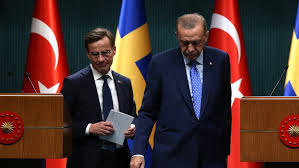
Introduction
The relationship between Turkey and Sweden has been under scrutiny recently due to various geopolitical issues and diplomatic maneuvers. Understanding the nuances of this relationship is crucial, as it reflects broader trends in international relations, especially regarding NATO expansion and regional security.
Recent Developments
In the past year, Sweden’s ambition to join NATO has been a focal point of its diplomatic engagement with Turkey. This aspiration surfaced in response to the changing security landscape following Russia’s invasion of Ukraine. Turkey, a long-standing NATO member, has expressed concerns regarding Sweden’s perceived support for groups Turkey classifies as terrorist organizations, such as the PKK (Kurdistan Workers’ Party).
In June 2022, Sweden and Finland formally applied for NATO membership, seeking protection under the alliance’s collective defense clause. However, Turkey’s approval became a significant hurdle due to its allegations against Sweden regarding the harboring of individuals linked to the PKK. The political figures of both nations have since engaged in extensive negotiations to overcome this impasse. Turkey calls for stricter laws against terrorism and an extradition of suspected militants while Sweden is eager to assure Turkey of its commitment to combat terrorism.
Negotiations and Agreements
After months of negotiations, a pivotal moment came in January 2023 when Sweden and Turkey announced a bilateral agreement. Under this agreement, Sweden pledged strengthened anti-terrorism laws and reinforced measures to address Turkey’s security concerns. This included an updated legal framework regarding the extradition of individuals deemed a threat to Turkey’s national security. Turkey, in return, signaled a willingness to support Sweden’s NATO bid, provided that both nations adhere to the terms of the agreement.
Conclusion
The Turkey-Sweden diplomatic relationship continues to evolve in the context of broader geopolitical dynamics. The increasing focus on security, particularly amid rising tensions with Russia, has placed renewed emphasis on cooperation between NATO allies. The outcome of this relationship will likely influence not just bilateral ties but also the future of NATO expansion and collective security efforts. For Sweden, successful integration into NATO may hinge on its ability to balance its commitments to Turkey while maintaining its domestic and international image.



